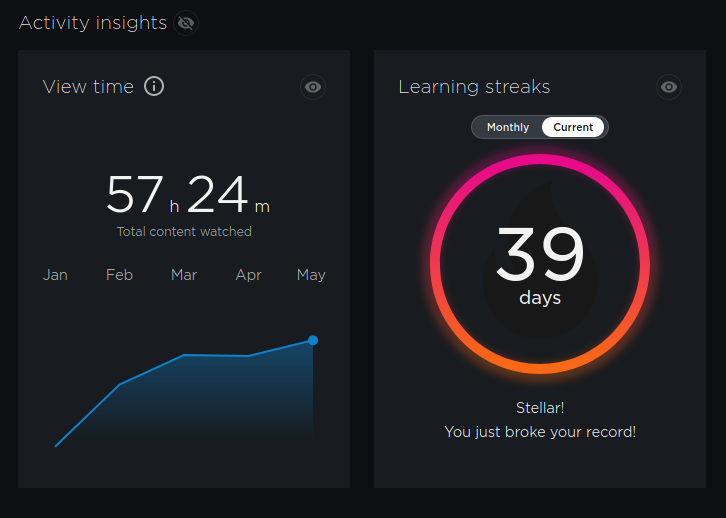On 23rd November 2018, I finished reading a book called The Slight Edge by Jeff Olson (which I re-read on August 21st 2019 - both dates according to my Goodreads profile). I highly recommend the book and one major take-away for me was that small consistent actions compound and create big results.
I can’t remember exactly when I adopted this principle into my life. But I still use it today and thought it would make for a good post. I incorporate this into my daily habits - one of which is do one set of push-ups.
Daily Push-ups 📅
In my habit tracker, I have a daily habit of doing only one set of push-ups – minimum 15 reps. The idea of only doing one set of 15 repetitions (instead of 3-5 sets for example), is designed to be the very minimum I can and should achieve even on a bad day.
Throughout the year, it is not uncommon for some days where you have a lot of energy. And some days where you have very little energy or are in a low mood thus less motivated i.e. a bad day.
By setting the task to an achievable goal on a bad day, will increase the likelyhood I will action and complete the task. If the goal was set to something more difficult i.e. 50 reps - 3 sets, I would be less motivated on those days and therefore risk breaking that daily consistency.
Also note that I’ve set only a minimum number of reps not a maximum. Sure, on a bad day I’ll just do 15 reps, but on a good day (which is usually more common) I’ll do 40, and even on a great day I may end up doing 60-80 reps. Sometimes I do smaller reps but more sets. The key thing is to maintain consistency.
This system for me has worked very well, if memory serves, I started this particular task last summer meaning I’ve been doing push-ups almost every day since August 2019, there were only two days I hadn’t achieved this daily task.
Tricking your mind 😎
This also taps into another productivity trick. The reason why we procrastinate is usually because our minds just isn’t in the ‘mood’ to do a particular task or chore, so we tend to put it off by doing something else. However, if you’re able to just start the task, your motivation to continue immediately increases.
The Wash Dishes Example
Imagine after dinner, a pile of dishes are stacked into your sink. You had decided to do them after finishing the TV show or movie you were watching, when it finishes you walk to your kitchen and see the stack of dishes and in no mood to wash them right now, maybe you say to yourself that you’ll do it in the morning. However, If you instead say to yourself, I’ll just clean one plate, you might just decide “I might as well just wash them” and then proceed to do so.
Simply actioning the task can be enough to motivate you and you’re less likely to put it off if the task is quick and easy.
So back to the push-ups example, making it an easy task by setting the minimum to 15 encourages me to just get it done and over with, it only takes 10-15 seconds to do them. However, once I begin, I can quickly decide whether I can do more, often my goal of only doing 15 reps (on that particular bad day) becomes 30-40 reps. And if not, I’ll just do a guilt-free 15 reps.
Big Results 📈
When I first started this habit, my initial minimum push-up repetition count was 5. I had gotten so out of shape, I was barely able to achieve 10-20 reps on a good day. Now I’m able to do up to 80+ (to failure) in a push-up set precisely because I’ve been doing them daily and so I increased the ‘minimum’ required to complete the task.
So I used the push-ups as an example, but the principle can be applied to any task you want.
My company had provided me an annual Pluralsight membership (In November 2019) so I can study at my leisure, I watched it a few times but not often at all. It wasn’t until March did I decide that I should actually use the membership, so I applied the same principle.
In my habit tracker, I added a new daily task to “Watch 10 minutes of Pluralsight”. I’ve missed only two days since starting the habit which according to Pluralsight was 24th February
 - My Pluralsight profile activity insights as of 24th May 2020
- My Pluralsight profile activity insights as of 24th May 2020
As you can see, by just aiming to watch 10 minutes a day (which sometimes ended up being 20-30 minutes), the results are huge and according to the “View Time” on my profile, the number of hours of content I’ve watched between March – May when compared to January and February has increased quite a lot.
Note: I watch them at 1.5x - 2.0x speed so the exact number of hours displayed are not accurate
Summary 📝
So this is how I create my habits, I have a daily evening routine which I perform small tasks to remain productive. Here are a few examples which I have adopted:
- 💪 One set of push-ups (min 15 reps)
- 🦵 One set of squats (min 15 reps)
- 📺 Watch 10 minutes of Pluralsight
- 📖 Read 10 pages of a book [1]
- 🍴 Empty dishwasher
- 🌇 Prepare next day’s necessities
Small consistent actions and yield big results. There are going to be some people who have more discipline and wouldn’t need their tasks to be as small as mine. However, if you’re not one of these people, then small tasks will work better for you.
To put it into persepctive, if we were to do some math on these, assuming the tasks were achieved with no days missed the whole year, that is a minimum total (per annum) of:
- 5475 push-ups
- 5475 squats
- 91.25 hours of Pluralsight
- 20 books [2]
As you can see, the results compound and can be huge. Set the ‘minimum’ low and do it consistently to get the benefits from that compound effect, also note that there will often be times where you exceed your ‘minimum’ because the goal itself is designed to be too easy, which means that its possible and likely to be higher.
There will be some ‘missed’ days that’s okay, I’ve already missed one or two (so far), but the main take-away is that, once the habit is set, you’re going to complete the (small) task more often than you’ll miss them. And because of that compound effect, you’ll yield huge results. 👍
[1] The 10 pages task, I don’t do consistently unless I have a book I want to read, however, once I decide on a book, I apply this principle in order to motivate me to complete it.
[2] Based on average page size of 273 for a book from this site: Scribe Writing
